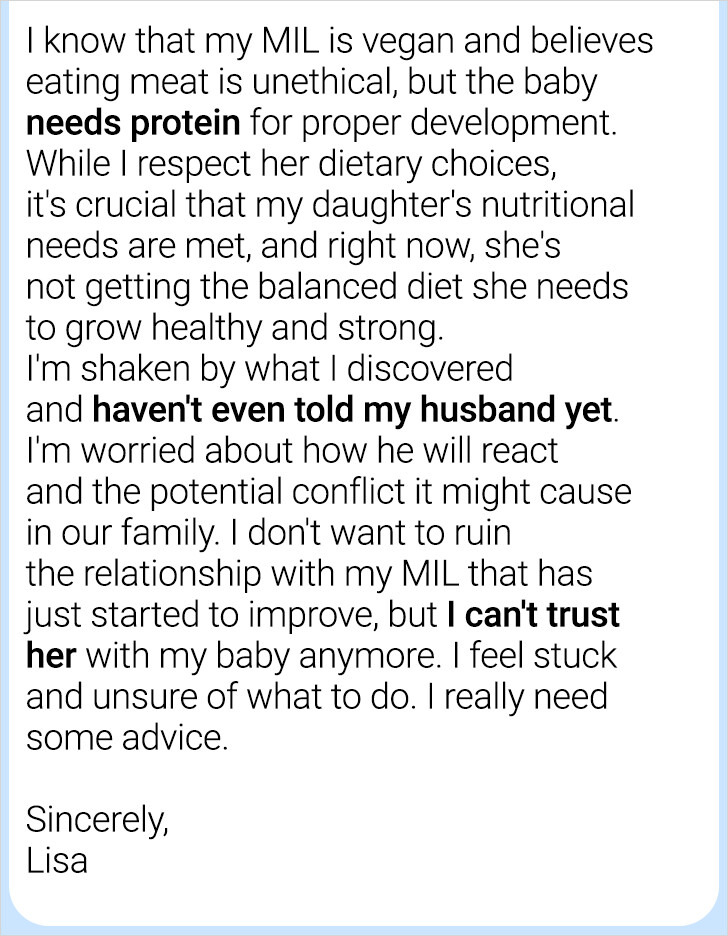Find someone else to care for your daughter as the MIL obviously has no idea how to do that
I Caught on Camera What My MIL Was Doing While Babysitting My Kid, And I Don’t Know What to Think

Lisa, a young mother who had returned to work, initially felt grateful when her mother-in-law offered to babysit her daughter. However, concerns grew as Lisa noticed changes in her daughter’s behavior and development. Suspicious, Lisa decided to record her mother-in-law on a hidden camera, but what she discovered left her in shock. Feeling conflicted and unsure about how to address the situation, Lisa turned to Bright Side for advice on navigating this delicate family issue.


Thank you, Lisa, for trusting us with your story. We understand that discovering your mother-in-law has been replacing the meals you cooked for your daughter with vegan foods is disturbing. We have gathered some advice to help you ensure your daughter’s needs are met while maintaining a good relationship with your mother-in-law.
Educate about nutritional needs.
Approach your mother-in-law calmly and explain the importance of a balanced diet for your child’s development. Offer to provide nutrition information or resources that align with vegan principles and your child’s health needs. This way, you respect her beliefs while ensuring your child’s dietary requirements are met. Suggest working together to find meals that satisfy both of you.
Seek mediation.
Consider involving a neutral third party, like a family counselor or mediator, to help with a conversation between you, your husband, and your mother-in-law. They can assist in discussing sensitive issues and make sure everyone’s concerns are heard and respected. A professional mediator can guide you to find a solution that works for everyone. This approach can promote understanding and maintain family harmony.
Set clear expectations.
Clearly communicate your expectations about your child’s diet and care when they are with your mother-in-law. Explain specific dietary requirements to ensure your child’s well-being while respecting her beliefs. This helps set clear guidelines and avoids misunderstandings. Make sure to discuss any concerns calmly and openly.
Seek professional guidance.
Consider getting advice from a pediatric nutritionist to make a meal plan that includes all the important nutrients your child needs to grow healthy. The nutritionist can give you specific advice for your child, making sure they get enough protein, vitamins, and minerals. Sharing this plan with your mother-in-law can help her understand how important it is for your child to eat well. It gives her a clear guide to follow when preparing meals, based on expert advice. This way, everyone can work together to make sure your child’s diet supports their growth and health.
Monitor care closely.
While rebuilding trust, gradually increase the time your child spends with your mother-in-law while closely monitoring her care. Keep in regular contact to get updates and feedback on how things are going. Address any concerns quickly to maintain trust. This will help meet your child’s needs and rebuild a trusting relationship with your mother-in-law.
Keeping a good relationship with your mother-in-law while protecting your principles might be challenging. Another reader, Alice, reached out to us with her story, also involving her mother-in-law. While planning her wedding, Alice chose a sleeveless dress, but her mother-in-law gave her an ultimatum: she wouldn’t pay for the dress unless Alice shaved her armpits.
Comments
Tell your husband that even though you respect your MIL's boundaries, the baby needs a balanced diet. Try to reach a compromise on your daughter's eating habits
Lack of key nutrients (including protein) during the first 2 years of a child's life can have permanent impact on brain development. I would stop allowing MIL to watch child. She was hiding what she was doing, so she knew that it was wrong. I understand how important the relationship is, but your daughter's life is more important. I would then start working with her on rebuilding trust, getting her to allow you and your husband to make the decisions about your daughter's health and life, and then allowing her to start spending one on one time with your daughter.
Related Reads
My Family Mocked Me for Starting a New Hobby at 60, They Want Me to Babysit Instead

My Husband Betrayed Me So Hard That I Almost Died, Now Everything Blew Up in His Face

14 Innocent Souls Who Learned a Lesson the Hard Way

I Banned My SIL From Seeing My Baby After She Made a Creepy Joke That Raised Red Flags

My Ex’s New Girlfriend Tried to Steal My Daughter—So I Made Her Regret It

My Husband Was Silent When His Mother Was Berating Me and Insulting Our Child

15 Neighbors You Wouldn’t Wish on Your Worst Enemy

15 Success Moments From Strangers That Deserve All the Golden Buzzers in the World

10 Powerful Stories That Show Kindness Always Finds Its Way Back

15 Moments That Show Kindness Is Quiet but Changes Everything

15 Moments That Prove Quiet Kindness Doesn’t Break, Even When We Do

11 People Who Chose Humanity Over Hatred in the Darkest Moments




